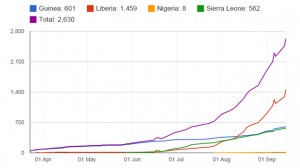A Viral Threat to Security
On December 6, 2014, in a small town in Southeastern Guinea, a two-year-old girl passed away. In March 2014, hospital staff alerted Guinea’s Ministry of Health of a mysterious disease in the Southeast of Guinea. The World Health Organization later identified this mysterious disease as Ebola and that two-year-old girl was Ebola’s first victim in this new outbreak[1]. The United Nations has since called this Ebola outbreak an “international public health emergency”, Medecins Sans Frontieres has called it “out of control”, and United States President Obama has gone so far as to call it a “global security threat”[2].
How can a disease such as Ebola be deemed a security threat?
When trying to define the term “security”, Mohammed Ayooh wrote “security-insecurity is defined in relation to vulnerabilities- both internal and external- that threaten to have the potential to bring down or weaken state structures, both territorial and institutional and regimes”[3].
Ebola, therefore, can be understood as a security threat because state structures of affected nations in West Africa are weakening as effective containment strategies are failing and national economies are suffering.
Since March 2014, there have been 2,630 victims of Ebola in Western Africa. This outbreak has killed more than all former outbreaks in history combined. The World Health Organization warns that there could be 20,000 cases of Ebola before the disease can be brought under control[4]. So how can this virus be contained? Since Ebola is only infectious after patients have started showing symptoms, isolation of infected patients, and contact tracing and surveillance of all people who the patients came in contact with in the last week should, in theory, stop the transmission. Some of the reasons why this process of containment has been so difficult to achieve in Western Africa is because many healthcare facilities have no or limited supplies, several cases have been misidentified, many local people are choosing not to go to healthcare facilities and some cultural practices increase infection risk. Distrust for authorities is a key reason why affected people might refuse to seek help. Another reason might be lack in education surrounding the spreading of viruses. A difficult issue is how to navigate certain cultural practices that are increasing the risk of infection. In Liberia and Sierra Leone, for instance, preparing a body for burial services involves washing of the body, touching and kissing by the family and community. [5]. How can national governments step in and ask people not to honor their dead and follow their traditions? How can international organizations ask such as thing?
Besides the difficulties of containment, Ebola has also had a disastrous effect on the economies of affected nations in Western Africa. On August 20, 2014, Sierra Leone’s Agriculture Minister Joseph Sam Sesay said, “The economy has been deflated by 30 % because of Ebola”. Due to many roadblocks and quarantined sections by the United Nations, Sierra Leone is having difficulty producing food. Sesay explains that “ We are now coming into the planting season which means a lot of agriculture is not happening, so down the line that will create food shortages and pressures on food prices. We are starting to see a rise in inflation and pressure on the national currency as well as a shortage of foreign exchange”[6]. The World Bank stated, “Billions of dollars could be drained from West African countries.” This loss comes out of every aspect of the nations’ economy from agriculture to travel and tourism bans[7]. This economic loss will take much time to rebuild, and for already weak economies, this setback is difficult.
The Ebola outbreak is a complex issue. This brief explanation does not do justice to the individual stories and the efforts that have been made by national and international bodies. It simply aims to illustrate why a virus outbreak can and should, in this case, be considered an issue of security. Affected nations in Western Africa are having tremendous difficulty containing Ebola, even with the help of international institutions, and the effects that this outbreak are having and will continue to have on the Western African economies are catastrophic.
[1] http://www.bbc.com/news/world-africa-28755033
[2] http://www.bbc.com/news/world-africa-28755033 and http://www.bbc.com/news/world-us-canada-29231400
[3] Class lecture September 11, 2014
[4] http://www.bbc.com/news/world-africa-28755033
[5] http://www.eurosurveillance.org/ViewArticle.aspx?ArticleId=20899 and http://www.bbc.com/news/world-africa-26835233
[6] http://www.bbc.com/news/business-28865434
[7] http://www.economist.com/news/international/21612158-epidemics-damage-economies-well-health-panicking-only-makes-it-worse

Read 1 comment